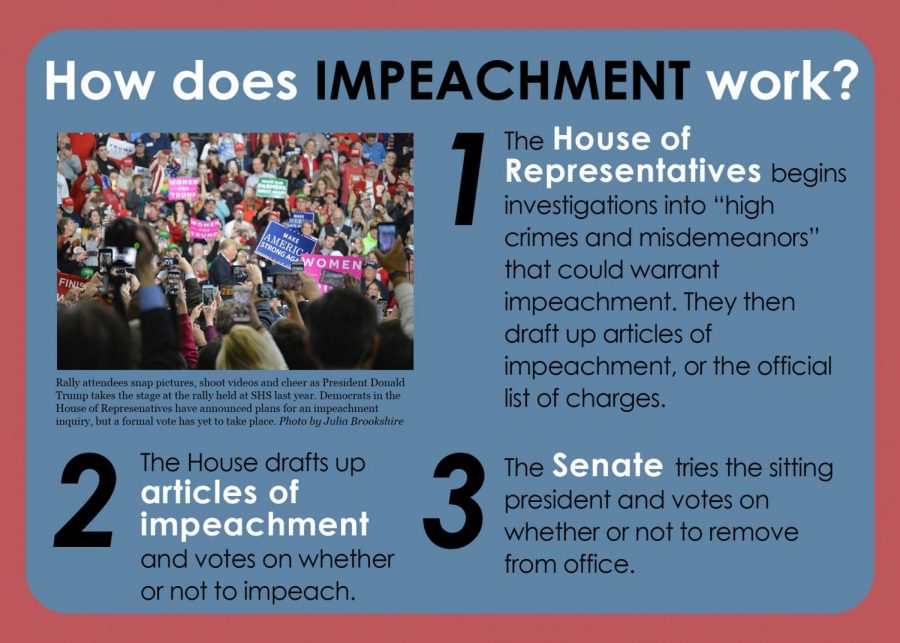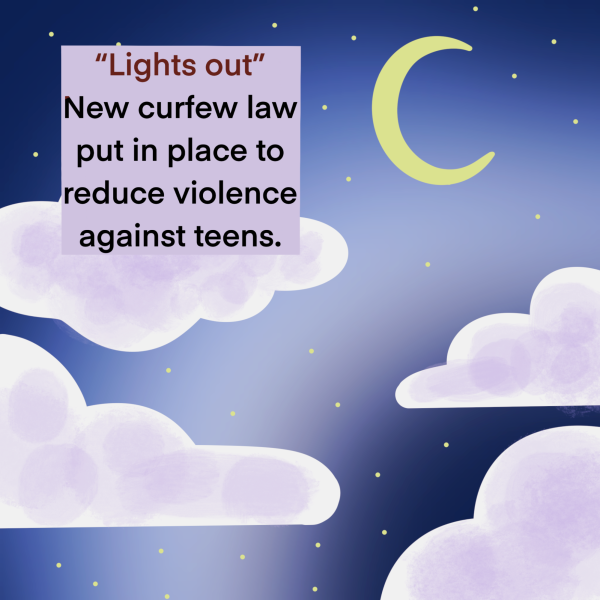Inquiring impeachment
The process of President Donald Trump’s possible removal from office has begun
The possible road to impeachment and removal from office of President Donald Trump began in July with a phone call.
The call was between Trump and President Volodymyr Zelensky of the Ukraine, and they were discussing U.S.-Ukraine relations. But then Trump mentioned a third party: Joe Biden, Democratic presidential candidate.
“There’s a lot of talk about Biden’s son, that Biden stopped the prosecution and a lot of people want to find out about that so whatever you can do with the Attorney General would be great,” Trump said, according to the transcript of the call released by the White House. “Biden went around bragging that he stopped the prosecution so if you can look into it … It sounds horrible to me.”
This was the catalyst for Nancy Pelosi, Speaker of the House of Representatives, to announce a formal impeachment inquiry on Sept. 24. An impeachment inquiry is the process in which members of the House draft up articles of impeachment, or the official set of charges against the sitting president. The House then votes on whether or not to impeach, and the Senate determines if the president should be removed from office.
But even this early inquiry stage has sparked conversation across the country.
“For students of politics, this is perhaps a once-in-a-lifetime opportunity…,” said Greg Shufeldt, Assistant Professor of Political Science at Butler University. “Who knows if we will ever find ourselves in another position like this, so I would encourage everyone who lives in the U.S. to be paying attention to this.”
According to Shufeldt, impeachment is defined as a “political process,” so partisanship is going to play a key role in how the issue unfolds. He says Congress is more polarized than ever before, with Democrats largely in favor of and Republicans opposed to an inquiry. Therefore, because of the Democrat-controlled House and Republican-controlled Senate, he sees it as highly likely that Trump will be impeached but not removed from office.
Some members of Congress, however, have reached across the aisle and condemned Trump’s actions, like Republican Sen. Mitt Romney of Utah. The transcript revealed Trump strongly suggested a foreign power uncover information about Biden, who could be his opponent in the 2020 election, in the context of the Ukraine receiving $400 million in military aid from the U.S. This has prompted statements that Trump engaged in a “quid pro quo” for his own political benefit.
“It’s not up for grabs that he urged Ukraine to investigate his political rival, and that is a violation of campaign finance law…,” said Professor Christine Barbour, who teaches American Politics at Indiana University. “That’s the key thing about impeachment. It focuses on a very specific action.”
Like Shufeldt, Barbour sees Trump’s impeachment by the House as “almost certain” because of the evidence stacked against him. Since the transcript of the phone call was released in September, multiple “whistleblowers” have stepped forward and confirmed that Trump did indeed request a foreign state interfere in the 2020 election, namely with an investigation of Biden. Whistleblowers are members of government that anonymously report potentially illegal activity from other members.
In addition to anonymous complaints, the White House itself confirmed the existence of a quid pro quo during a press conference on Oct. 17.
“We do that all the time with foreign policy…,” acting Chief of Staff Mick Mulvaney said. “I have news for everybody: Get over it. There’s going to be political influence in foreign policy.”
For now, mainly Democrat members of the House are continuing their investigation and conducting hearings, in an attempt to both begin drafting up articles of impeachment and garner more Republican support. The inquiry has taken place largely behind closed doors, leading certain members of Congress and the public to call for more transparency. Trump has labeled the investigation a “witch hunt.”
Regardless of the outcome, Shufeldt says he believes it is valuable for students and young people to pay attention to the current situation, no matter their personal politics.
“I tell my students in class that this is a fantastic time to study political science,” Shufeldt said. “So ask questions, learn more information and use that to have an informed opinion.”

Hello! I’m Haley Miller, Editor-in-Chief of The Journal this year. I joined this publication all the way back at the end of my freshman year, and I can’t...






